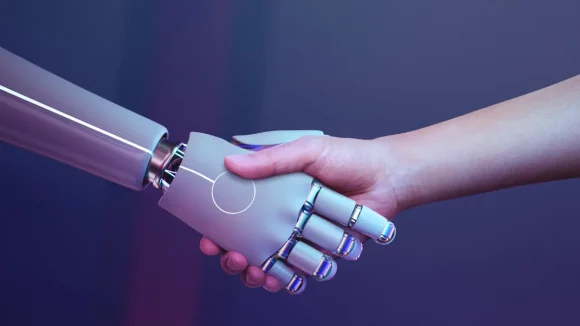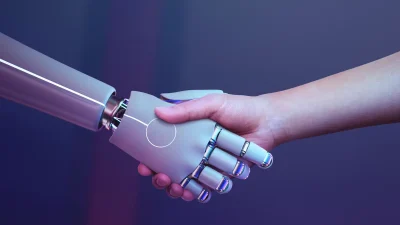AI anxiety and the fear of advanced technology have been around for years, mostly due to Hollywood’s depiction of the doomsday-type scenario in which an evil entity annihilates humanity.
But here’s the plot twist: AI isn’t here to steal your job… It’s going to supercharge it.
Recent studies show how AI is becoming the ultimate career wingman by boosting productivity, opening the door to new opportunities, and as a bonus, even improving work-life balance.
Understanding AI and its impact
First, let’s define AI and its sudden mainstream rise.
What is Artificial Intelligence?
AI refers to the development of computer systems that can perform tasks typically requiring human creativity and intelligence, such as learning, problem-solving, and decision-making.
And it’s not new, it’s been around for decades – early pioneers include Alan Turing and John McCarthy.
However, it wasn’t until recent breakthroughs in machine learning and deep learning that AI truly began to flourish.
AI technology advanced rapidly in recent years, in areas like natural language processing (NLP), image recognition, and predictive analytics.
AI tools are more accessible and powerful than ever, with the ability to give industries (and everyday life) a much-needed productivity boost.
The rise of AI anxiety
Are you anxious about AI?
The fear of artificial intelligence stealing our jobs or taking control of human decision-making is known as ‘automation anxiety’ in psychology.
Concept clarified: At its core, it is the fear that machines will make human skills, labor, thought, creativity – and ultimately, humans – obsolete.
Science fiction writer Isaac Asimov coined the phrase ‘Frankenstein complex’ – the fear that AI technology could become destructive, much like the monster in Frankenstein.
While these terms have been around for a while, the public debut of OpenAI’s ChatGPT and other tools caused AI anxiety to skyrocket. The rapid advancement has left many concerned about machines replacing a wide range of jobs.
Rather than eliminating jobs, artificial intelligence can be a powerful tool to improve them in ways we may not have anticipated. Unfortunately, many news stories only fuel anxiety.
But there is a middle ground, even as new technologies continue to rise.
Let’s break down how AI is becoming the ultimate career wingman.
AI tech boosts productivity
Most people worry so much about how AI developments are out to replace us, instead of using it as a super-efficient assistant.
A study by MIT Sloan found that when used right, generative AI can boost worker performance by up to 40%.
But there’s a caveat to AI productivity
Just blindly following what artificial intelligence recommends will lead to trouble. If someone uses AI technologies to enhance their workflow, they should still be able to explain what they did or how they did it.
MIT Sloan professor Kate Kellogg says “Managers and workers need to collectively develop new expectations and work practices to ensure that any work done in collaboration with generative AI meets the values, goals, and standards of their key stakeholders.”
AI can also enhance your decision-making abilities.
In retail, technological advancements and AI-powered analytics can provide insights into consumer behavior.
According to Harvard Business Review, AI-assisted decision-making can fast-track your chance at a promotion by 50%.
Meanwhile, in logistics, AI-powered route optimization software can give your team’s productivity a serious boost. Drivers can deliver more packages in less time, focusing on customer service rather than navigation.
ALSO READ: AI in Logistics
Use generative AI to upskill your business
IBM’s latest report shows many companies are implementing AI to take over mundane tasks. This allows them to spend more time on the roles that require a “more human touch.”
FedEx uses artificial intelligence technology for predictive maintenance of its vehicle fleet.
By following their example, your business can upskill, sure, but so too the mechanics who now understand both traditional vehicle maintenance and AI diagnostics. Even banks are now using AI to detect fraud.
The result? Streamlined productivity for the company, and more opportunities to learn new, higher-level skills for the humans in its employ. Because let’s face it, your business still needs human intelligence, and they still need to develop new skills.
Speaking of which, AI can also help you climb the corporate ladder.
Will rapid AI advancements hinder your progress?
Think artificial intelligence is holding humans back? Think again. A recent Slack Workforce study shows that AI users are leveling up their career advancement trajectory. It improved productivity for 81% of desk workers.
In addition, the “executive urgency to incorporate AI tools into business operations” increased more than seven times over the past six months.
But how exactly do AI tools boost your career? For starters, it allows you to focus on high-value tasks.
In the logistics industry, for example, AI development includes route optimization, leaving you free to strategize on improving customer relationships or expanding services.
Case study: The introduction of autonomous vehicles (AVs) in the transport sector is creating new roles. While some human jobs may decrease, positions like autonomous vehicle technicians and AI fleet managers are emerging.
And this trend will continue as new technology evolves continually.
Causes of AI anxiety
AI anxiety is an umbrella term that covers a vast range of fears – from job security to it being a threat to employees’ work-life balance.
The fear of losing one’s job to automation or AI-powered systems is particularly pronounced in industries where tasks are repetitive or can be easily automated.
However, experts say that while AI may automate some tasks, it will also create new job opportunities.
Warehouse automation is a prime example of this. In a recent article, we discussed how it can fix the industry’s labor crisis, make the work environment safer for human workers, and help the supply chain as a service (SCaaS) industry to grow.
The key is for companies (and individuals, if they can) to invest in education and training.
Job security benefits from using AI
While many are worried about AI and robots stealing their jobs, it actually secures your place in the business environment.
Dr. Wang Yi-Ren, assistant professor of organizational behavior at Asia School of Business (ASB), says an online survey shows that the “ability to use and adapt to AI is becoming a highly valued skill in today’s digital economy, leading to better job prospects and security.”
This benefits senior professionals more than any other demographic. While AI handles routine tasks for them, they have the chance and the energy to focus on more important matters.
“Surprisingly, we found that employees using AI reported a significantly lower level of job insecurity,” Dr. Wang adds.
In the retail industry, AI-powered inventory management systems secure human jobs by making businesses more efficient and competitive. Retailers using AI for inventory have less stock wastage and an increase in sales.
READ: AI in e-commerce
Lower AI anxiety levels, more work-life balance
The term work-life balance has been around since the height of the COVID-19 pandemic, but artificial intelligence is now changing the real impact it has on our lives.
According to Analytics Vidhya, AI-driven tools like Asana or Notion can easily streamline workflows, while smart home tech and automation can manage your household.
How? Smart devices like Google Assistant or Amazon Alexa are AI-powered and can remind you of routines, turn your appliances and your lights on and off at certain times, and can even help you save on the energy bill.
Offices and companies can use AI to enhance security through smart cameras and systems that recognize faces, detect unusual activity, and alert management instantly.
Automated cleaning devices take the hassle out of chores while smart irrigation systems keep the lawns green.
What does this mean for your e-commerce business? With AI chatbots handling customer inquiries 24/7, you can reduce the need for your human customer service representatives to work unsociable hours.
The result? More time for you and your staff to be productive at work, and have a life outside of it.
ALSO READ: AI Anxiety: Australians demand safeguards
About the author
Cheryl has contributed to various international publications, with a fervor for data and technology. She explores the intersection of emerging tech trends with logistics, focusing on how digital innovations are reshaping industries on a global scale. When she's not dissecting the latest developments in AI-driven innovation and digital solutions, Cheryl can be found gaming, kickboxing, or navigating the novel niches of consumer gadgetry.











